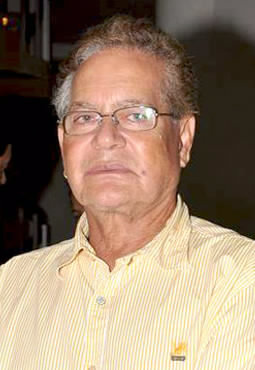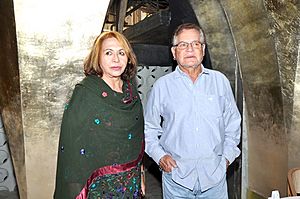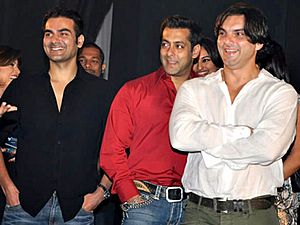Salim Khan facts for kids
Quick facts for kids
Salim Khan
|
|
|---|---|

Khan in August 2012
|
|
| Born | 24 November 1935 Indore, Indore State, British India
|
| Occupation |
|
| Years active |
|
| Spouse(s) |
|
| Children | 5 (including Salman Khan, Arbaaz Khan, Alvira Khan Agnihotri, Sohail Khan) |
| Relatives | See Khan family |
Salim Abdul Rashid Khan (born on November 24, 1935) is a famous Indian actor, film producer, and screenwriter. He is well-known for writing stories and scripts for many Bollywood movies. He was part of a very successful writing team called Salim–Javed, with Javed Akhtar.
Salim Khan and Javed Akhtar were among the first screenwriters in Hindi cinema to become as famous as movie stars. They are considered some of the most successful Indian screenwriters ever. Salim Khan mostly created the stories and characters, while Javed Akhtar wrote the dialogues.
The Salim-Javed team changed Indian cinema in the 1970s. They helped create the "Bollywood blockbuster" style and popular movie types like the masala film. Salim Khan also helped create the "angry young man" character, often played by Amitabh Bachchan. Their films are some of the highest-grossing Indian films of all time. These include Sholay (1975), which was the highest-grossing Indian film at that time. Other hits were Seeta Aur Geeta (1972), Zanjeer (1973), Deewaar (1975), and the Don movies. Sholay is also seen as one of the greatest Indian films ever.
Salim Khan is also known for his family, the Salim Khan family. He is the father of three Bollywood actors: Salman Khan, Sohail Khan, and Arbaaz Khan. His daughter, Alvira Khan Agnihotri, is a film producer. He is married to Salma Khan (Sushila Charak) and actress Helen Richardson Khan.
Salim Khan won six Filmfare Awards with Javed Akhtar. In 2014, he received the Padma Shri award from the Indian government. In 2024, Amazon Prime released a documentary series about Salim-Javed called Angry Young Men.
Contents
Early Life and Education
Salim Khan was born in Indore, which was part of British India (now Madhya Pradesh, India). His family was well-off. His grandparents are believed to have come from Afghanistan in the mid-1800s. They served in the cavalry of the British Indian Army.
Salim Khan was the youngest child. Both his parents passed away by the time he was 14. His mother, Siddiqa Bano Khan, died when he was nine. His father, Abdul Rashid Khan, was a high-ranking police officer. Salim's father died in January 1950.
After his father's death, Salim attended St. Raphaels' School in Indore. He then went to Holkar College in Indore and earned his BA degree. His older brothers supported him financially. He was very good at sports, especially cricket. He even got a car while in college. He also learned to fly planes. During these years, he became interested in films. His friends encouraged him to try acting because of his good looks.
Career in Films
Becoming an Actor
Salim Khan started his film career as an actor in 1960. His first film was Baraat. He moved to Mumbai for this role. He was paid a signing amount and a monthly salary.
He used the name Prince Salim during his acting days. He played small roles in about two dozen films over the next ten years. Many of his appearances were so minor that his name was not even in the credits. He acted in films like Teesri Manzil (1966) and Diwaana (1967). His role in Teesri Manzil as the hero's friend was his most important acting part.
Transition to Screenwriting
After acting in 25 films, Salim Khan realized he was not meant to be an actor. He decided to focus on writing scripts in the late 1960s. He continued to use the name Prince Salim for a while. One of his early notable scripts was for the film Do Bhai (1969). He also worked as a writing assistant for Abrar Alvi.
The Salim-Javed Duo
Salim Khan met Javed Akhtar while working on the film Sarhadi Lootera. Their friendship grew because their bosses were neighbors. Salim helped writer/director Abrar Alvi with screenplays. Javed helped Kaifi Azmi with poetry. Soon, Salim Khan and Javed Akhtar decided to work together as a script-writing team. They became known as Salim–Javed. Salim would create the stories and plots, and Javed would write the dialogues and sometimes song lyrics. They would brainstorm ideas together for the final script.
Rajesh Khanna, a famous actor, gave them their first big chance as writers. He asked them to fix the script for his film Haathi Mere Saathi. This film became a huge hit. After this success, G. P. Sippy hired them to work for Sippy Films. They wrote screenplays for many successful films like Andaz, Seeta Aur Geeta, Sholay, and Don.
The Salim-Javed team wrote 24 films together, and 20 of them were hits. Some of their famous films include Andaz (1971), Haathi Mere Saathi (1971), Seeta Aur Geeta (1972), Yaadon Ki Baaraat (1973), Zanjeer (1973), Deewaar (1975), Sholay (1975), Don (1978), and Mr. India (1987).
Salim-Javed changed how scriptwriters were seen in the Hindi film industry. Before them, writers were often not credited or paid much. Because their scripts were so successful, they demanded higher pay and insisted their names appear in film credits. They also became involved in many stages of filmmaking.
Salim Khan was very important in starting Amitabh Bachchan's career. Bachchan was a struggling actor before Salim-Javed discovered him. They were impressed by his acting and insisted he be cast in their films. Salim Khan personally introduced Bachchan to directors like Prakash Mehra.
Later Years in Writing
Salim Khan and Javed Akhtar stopped working together in 1982. After that, Salim Khan wrote scripts and dialogues for successful movies like Angaaray (1986), Naam (1986), and Jurm (1990).
From 1983 to 1996, he wrote scripts for thirteen films. These included Patthar Ke Phool, which starred his son Salman Khan. He also wrote Pyaar Kiya To Darna Kya and Auzaar. Both of these films were produced by his youngest son Sohail Khan and starred Salman.
His last unofficial work with Javed Akhtar was for the film Baghban (2003). Neither Salim Khan nor Javed Akhtar were officially credited for their contributions to the speeches in the film.
Personal Life

Salim Khan has been married twice. His first marriage was to Salma Khan (born Sushila Charak) on November 18, 1964. They have four children: three sons, Salman, Arbaaz, and Sohail, and one daughter, Alvira.
In 1981, Salim Khan married actress Helen Richardson. Later, they adopted a girl named Arpita.
His eldest son, Salman Khan, is one of the most successful actors in Indian cinema. His other two sons, Arbaaz Khan and Sohail Khan, are also actors and film producers. His daughter Alvira Khan Agnihotri is married to actor and filmmaker Atul Agnihotri. His younger daughter Arpita is married to Aayush Sharma.
Awards and Recognition
Filmfare Awards
| Filmfare Awards | |||
|---|---|---|---|
| Year | Category | Film | |
| 1983 | Best Screenplay | Shakti (1982) | |
| 1976 | Best Dialogue | Deewaar (1975) | |
| Best Screenplay | |||
| Best Story | |||
| 1974 | Best Screenplay | Zanjeer (1973) | |
| Best Story | |||
Other Honors
- Sholay (1975) was ranked first in the British Film Institute's 2002 poll of "Top 10 Indian Films" of all time.
- He received a Lifetime Achievement Honour at the Apsara Film & Television Producers Guild Award in January 2014.
- He was offered the Padma Shri award in 2014 but did not accept it. He felt he deserved a higher honor, like the Padma Bhushan.
Images for kids
 | Claudette Colvin |
 | Myrlie Evers-Williams |
 | Alberta Odell Jones |





